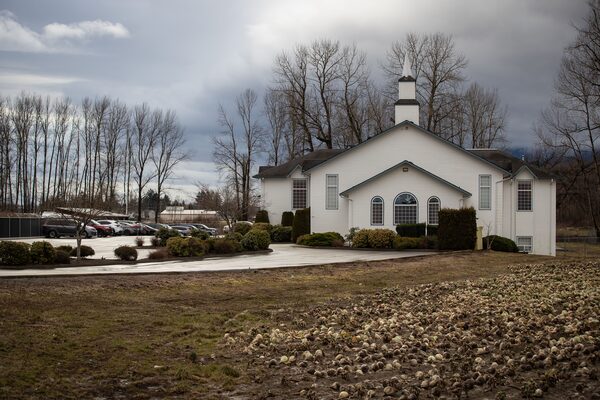
Vehicles are seen in the parking lot at Free Reformed Church as people attend Sunday Service, in Abbotsford, B.C., on Feb. 21, 2021.DARRYL DYCK/The Canadian Press
Among the most high-profile offenders of those resisting public-health edicts related to COVID-19 have been churches.
From the earliest days of the pandemic, ecclesiastical leaders around the globe have led vocal campaigns against measures infringing on their ability to gather their flock. And with pandemic fatigue seemingly growing by the day, opposition to COVID-19-related rules by churches appears to be rising too.
Not all of them, mind you – not by a long stretch. If anything, the pandemic has caused a noticeable fissure in the broader religious community, with many leaders angered by the actions of their fellow brethren. In B.C., for instance, 38 church heads signed a letter stating their disappointment with counterparts who have brashly flouted public-health orders.
The scofflaws generally appear to be among denominations that skew Christian-fundamentalist. This group has particularly exerted itself in the United States, where some pastors have encouraged their congregations to ignore health orders and used their pulpits to suggest COVID-19 is nothing short of a hoax – even though it has now claimed the lives of half a million Americans.
The issue is making headlines in Canada too. James Coates, a pastor of a fundamentalist Christian church outside of Edmonton, has been in custody since last week, related to charges around repeatedly violating public-health restrictions. He refused to agree to the conditions of his release, and so he remains in prison; the matter is on the Wednesday docket of an Alberta court.
A number of legal challenges have been launched by church groups across the country to protest laws they feel are unfair and unconstitutional. They point to bars and restaurants where dozens have often gathered in confined spaces, and ask why churches appear to be subject to different rules. Some church leaders have cited the words of provincial leaders in their defence, with one pastor in Alberta referencing the fact Premier Jason Kenney has, on numerous occasions, called COVID-19 an “influenza.”
Rules affecting churches differ across the country. In Alberta, for instance, churches are restricted to 15 per cent of their capacity; in Ontario, in-person services or ceremonies are limited to 10 people or less. In B.C., meanwhile, all in-person religious gatherings have been fully suspended.
Most of the challenges centre around the same notion: that the public-health orders violate a church’s Charter rights, including freedom of religion, assembly and association. Governments are certain to respond that the Charter allows for “reasonable limits” on those freedoms under unique circumstances; a pandemic that has killed more than 20,000 Canadians and prompted several provinces to declare states of emergency might qualify as such.
While I wouldn’t dismiss all of the arguments churches are raising in their defence, their chances of succeeding seem remote.
More than a few disgruntled faith leaders have undermined their case by mocking the severity of COVID-19. In a video presentation posted to his church’s website, Pastor Brent Smith of Langley, B.C.’s Riverside Calvary Chapel, says COVID-19 is not “the bubonic plague.” Others have suggested that their decision to defy provincial edicts has been done on orders from God – a claim that is, at the very least, difficult to prove in an earthly court of law.
It’s impossible to ignore the potential influence of counterparts in the United States, where churches are big business. The reality is it’s more difficult to raise funds virtually than it is in person, where it’s much easier to “pass the hat.” Loss of income is certainly at the heart of at least some of this resistance.
At the end of the day, though, churches can’t be exempt from laws put in place to protect broader society. Churches have caused superspreader events that have infected multitudes of people. Many of those who attend church are older, and thus more vulnerable to having a deadly response to COVID-19 should they contract it. Surely, our faith leaders don’t want that. And surely, no government would just sit back and allow that to continue just because churches insist it is their God-given right.
The majority of churches in Canada have abided by the health laws we currently live under and have shown they can continue to minister, with the aid of technology, in a meaningful way without gathering in person.
When it comes to the pandemic, no one is immune from its deadly potential. Nor should anyone be exempt from orders designed to protect us all – not even our houses of worship.
Keep your Opinions sharp and informed. Get the Opinion newsletter. Sign up today.
 Gary Mason
Gary Mason